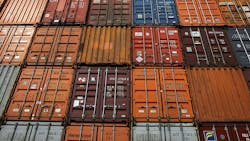China to Cut Tariffs on Imports Including Machinery, Textiles
China will cut import tariffs on goods including machinery, paper, textiles and construction materials from Nov. 1, in a move that would lower costs for consumers and companies as a trade war with the U.S. deepens.
The decision will lower tariffs for 1,585 products, state radio reported, citing a meeting of the State Council. The combination of these and other tariff cuts this year will lower the tax burden on consumers and companies by about 60 billion yuan (US$8.7 billion), the radio reported.
The Chinese government has yet to detail how the general tariff cut will apply to U.S. goods affected by retaliatory tariffs in the trade war.
In theory the same goods can receive a lower basic tariff and still have extra duties piled on by the response to President Donald Trump’s measures. Whether goods affected by the trade war receive this treatment will depend on precisely which items the government selects to cut duties on. The Chinese government hasn’t released that list of the specific goods yet.
The average import tax for some machinery will be reduced to 8.8% from 12.2%, for textiles and construction materials to 8.4% from 11.5%, and for paper and some other products to 5.4% from 6.6%, the radio station reported.
The decision was aimed at meeting the demand of companies to upgrade production and lower costs, and to help fulfill the public’s diversified consumption appetite, according to a statement. It follows on from similar moves earlier this year which were aimed at reducing prices of imports to stimulate consumption and is in line with China’s pledge to boost imports.
Wednesday’s decision will lower the average most-favored nation tariff rate to 7.5% from 9.8%. China still has a higher average tariff rate than many developed economies. The U.S.’ average applied MFN rate was 3.4% in 2017, and in general the Trump administration has accused China of being a protectionist economy.
Any reduction of tariffs usually must be offered to all countries equally under World Trade Organization rules, but U.S. goods would still be subject to China’s retaliatory tariffs.
By Bloomberg News
About the Author
Bloomberg
Licensed content from Bloomberg, copyright 2016.
